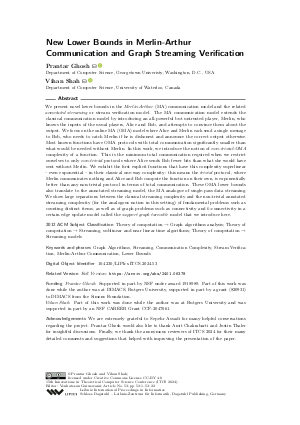@InProceedings{ghosh_et_al:LIPIcs.ITCS.2024.53,
author = {Ghosh, Prantar and Shah, Vihan},
title = {{New Lower Bounds in Merlin-Arthur Communication and Graph Streaming Verification}},
booktitle = {15th Innovations in Theoretical Computer Science Conference (ITCS 2024)},
pages = {53:1--53:22},
series = {Leibniz International Proceedings in Informatics (LIPIcs)},
ISBN = {978-3-95977-309-6},
ISSN = {1868-8969},
year = {2024},
volume = {287},
editor = {Guruswami, Venkatesan},
publisher = {Schloss Dagstuhl -- Leibniz-Zentrum f{\"u}r Informatik},
address = {Dagstuhl, Germany},
URL = {https://drops.dagstuhl.de/entities/document/10.4230/LIPIcs.ITCS.2024.53},
URN = {urn:nbn:de:0030-drops-195815},
doi = {10.4230/LIPIcs.ITCS.2024.53},
annote = {Keywords: Graph Algorithms, Streaming, Communication Complexity, Stream Verification, Merlin-Arthur Communication, Lower Bounds}
}

 Creative Commons Attribution 4.0 International license
Creative Commons Attribution 4.0 International license

























